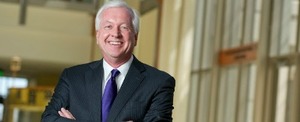Finance Professor Jeffrey Bergstrand speaks to AP about potential regulations from forex scandal
Published: November 12, 2014 / Author: Danica Kirka

Trillions of dollars change hands every day in the global foreign-exchange markets. Major currencies like dollars, euros and yen are traded in a scantly regulated market dominated by a group of elite banks.
Regulators in the U.S., Britain and Switzerland are accusing several international banks of conspiring to manipulate the rates for exchanging currencies. They announced Wednesday a total of $3.4 billion in fines against Citibank, JPMorgan Chase, HSBC, Royal Bank of Scotland and UBS.
WHAT HAPPENED?
Regulators in the U.S. and Europe found that the banks had failed to adequately train and supervise foreign currency traders. As a result, traders were able to form groups that shared information and sought to manipulate the market.
WHY IS IT IMPORTANT?
The scandal could become even bigger than the one surrounding the rigging of the London interbank offered rate, or LIBOR, which resulted in billions in fines for the banks implicated. Experts say that because the forex probe goes to the integrity of the markets, rather than just a single rate, it could have greater repercussions.
Jeffrey Bergstrand, University of Notre Dame finance professor and former Federal Reserve economist, says it is possible the case will result in tougher regulations for the markets — but that it would have to be coordinated internationally.
“The foreign exchange market is going to be difficult because it is so diffuse,” he said “The boundaries are the market itself.”
Read entire story on the Associated Press website.
Bergstrand’s comments also appear in these media outlets among others:
ABC News
Mail Online
The Economic Times
McDowell News
Related Stories




